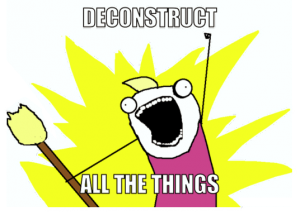I recently read an article titled “What It Feels Like to Be a Special Needs Mom” and I quite enjoyed it. It also dawned on me, there will probably never be an article titled “What It Feels Like to Be a Special Needs Dad” and the reason for this is quite simple, there’s no one to write one.
As the parent of a newly diagnosed child that has special needs, you quickly come to realize that those needs are essentially you. They need you first and foremost. That generally means that mom becomes a stay at home mom and dad has to work longer and harder than ever. Gone are the dreams of date nights with a babysitter at home because you can’t just pick a random kid in your neighbourhood to watch your child and even if you did go out, you’d never be able to stop thinking and worrying about your child. Both mom and dad lose sleep and find themselves with libraries full of information to have to learn. The bills not only stay the same despite dropping from 2 incomes to 1 but the bills actually go up substantially as diets, therapists, frequent trips to hospitals and doctors, special medications, equipment and more are required… all of the time. So as a dad, you now find yourself working multiple jobs or longer hours or even having to find a whole new line of work to make the income as close to the expenses as possible. Guess what you do when you get home? Play with your child? Rub your wife’s sore feet? No, most likely you go right to sleep and wake up to do it all again tomorrow.
While you’re at work, mom is off to those therapy sessions and doctors appointments and soaking in more information than she ever did in years of college and at some point, she’ll have to teach it all to you. You will have to face the fact, more and more and more that you are missing those sessions, those appointments and everything else in their lives. You’re missing it all because if you don’t, there won’t be any therapy sessions or doctors appointments. You’re becoming more and more disconnected from the very family that you are supporting. You imagine there has to be a better way, a more suitable balance but then the next big expense comes in and that thought is gone. Meanwhile mom is going crazy from all the appointments and only wishes that someone else (you) could do one or two of them once in a while.
With mom learning so much and being home, those very rare moments of free time become reaching out points where they find other special needs moms on the internet all seeking the same thing… advice, feedback and mostly, someone that they can relate to. They share pictures of dirty houses and don’t feel so bad about how their own house looks, they share recipes and money saving ideas and for a little while, they feel a connection again. At some point, many moms start to become that source of advice and relation and start blogging, writing articles and maybe even public speaking. So what happens when a dad wants to do the same? Well, as we’ve established, there’s almost no time for such a thing. Dads struggle to maintain a connection with their own family much less other people online. Also, if most dads can’t find the time or energy, who are they going to connect with? Other dads that have no time or energy? There’s likely not going to be very many. Yes, there are some and the numbers are growing, which is great, but it’s still a very small number. Dads could really use people to relate with as well and those that could give them some advice but finding them is near impossible and even more so if you never have the time to sit at the computer in the first place.
If and when you do take a dip into the Internet pool, you’ll find a lot of stigma and stereotypes that may just make you want to get back out as quickly as can. First, most of the moms you find will be talking about how their deadbeat husbands are either in total denial and do nothing to help, they’ve straight up left and abandoned their family or… again, beating a dead horse here, has simply lost connection with their family and here’s mom on the Internet writing about how little they see him or how little he does around the house. Worse than that, and this applies to all dads so just consider this as an extra pack of weights to put on your shoulders, there’s still this “oh so funny” theme of equating dads to being just grown up children that mom has to take care of too. There’s this constant running joke about how immature men are and how wives have to take care of them just like they do their kids. This is extremely hurtful and insulting and even more so, sends a terrible message to your own children about how they should think or respect their father. As the dad a special needs child that is at the breaking point pretty much every single day for years and years, it’s tough to go online in search of those that can relate to you only to be hit smack in the face about what a child you are.
One thing all of that will do though, and you’ll feel even if you don’t read all of that, is that you’ll always want to do more but lack the time and energy to do it. Nothing will weigh you down more than the feeling of not being able to do more. More money, more play time, more family time, more visits to the therapists with mom, more making dinners so that mom doesn’t have to, more of just… family. And on those rare days when you can, like a holiday or vacation time or something where you think “finally, family time!”, that’s when the basement will spring a leak or the car will break down or the fridge will die because even though you’ve never done anything but your very best, somehow the universe just thinks it would be funny to fill that “free time” of yours with something that you need to. Visiting old friends? Nope. Dinner out? Nope. Sitting on the couch with your family? Nope. Sorry, that’s no longer things you do.
As the father of a special needs child, you quietly have to go to work and then to bed and then to work and then to bed all the while very aware of the insulting child comparisons online, aware of your wife complaining to other wives and comparing notes about how their husband is never around. You have to quietly wish for more, wish to do more, hate that you can’t do more because if you do complain, oh, you’ll hear about it. How dare you complain when you’re not even there doing anything? You’ll have to quietly hate that your son will never follow in your footsteps or that you’ll never get really experience that “daddy’s little girl” feeling because if you do complain, then you’re in denial and not accepting your children for who they are. You have to sit quietly and wish that you could see friends more, that you could see your own wife more, that you could actually be the father that you’ve always dreamed you would be… because… because who would listen to you even if you did say anything?
No, there’ll never be a “What It Feels Like to Be a Special Needs Dad” article on any major news sites or anything (and no, this little blog most definitely does not count) because there is no one to write one. And if they did, no one to read it. Moms don’t want to hear it, dads are too busy to write or read it.
There are single parents out there taking care of their kids, sometimes more than 3 children all by themselves and they’re dads. Not the mom, dad. They’re doing it all on their own. It’s far more rare than single moms but they are out there. And because there are no articles written by them or about them or it just seems so impossible to imagine or relate to, they do it quietly, alone. There are stay at home dads too where the mom is almost never home having to foot the bill and miss out on all the family stuff. Those dads cook for their wives, do all the laundry, make and be at all the appointments. They do what needs to be done just as much as any mother in the same position, as does their wife who works and sleeps and works and sleeps.
No, we aren’t like all those other guys that live in denial, we’re certainly not like those dads that abandoned their families and we are most definitely not like the grown up children that you all seem to think is so funny. Just because the articles aren’t there, it doesn’t mean we’re not. Just because you aren’t hearing about all of our struggles, it doesn’t mean we’re not struggling. Just because you don’t read all about our emotions, it doesn’t meant that we don’t have any.
Our special needs child is just as much our child as yours. Moms and dads, working together. We exist. We matter.






 I keep seeing some disturbing responses to the Kelli Stapleton case and I thought I’d address a couple of them today… a sort of, let’s clear the air, type of post.
I keep seeing some disturbing responses to the Kelli Stapleton case and I thought I’d address a couple of them today… a sort of, let’s clear the air, type of post.





